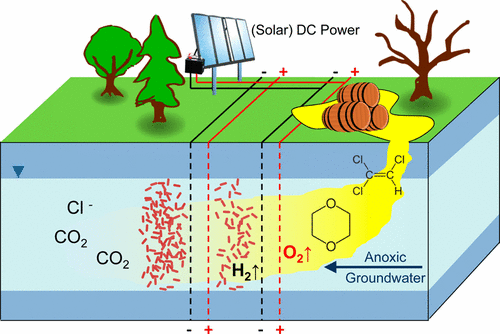Pilot-Scale Electrochemical Treatment of 1,4 Dioxane
- Magneli Materials

- Aug 26, 2019
- 2 min read
Updated: Aug 28, 2019
Jens Blotevogel, Ph.d., of Colorado State University, wrote a paper on the electrochemical treatment of 1,4 dioxane and how promising pilot scale testing needed to be scaled up. Magneli Material's new Ti407 anodes are allowing scaling up of this technology ready to be used in water disinfection.

"Electrochemical treatment is a promising emerging technology in which direct current is applied to drive the degradation of aqueous contaminants. Several bench‐scale studies have demonstrated the capability of electrochemical oxidation to fully mineralize refractory organics such as pesticides and perfluorinated compounds. However, insights into large‐scale design and field performance are critically lacking. Here, we designed six pilot‐scale reactors and tested their performance and efficiency for the treatment of groundwater contaminated with 1,4‐dioxane (1,4‐DX) at concentrations exceeding 1000 mg/L. Anode surface area‐normalized degradation rates increased with increasing potential applied, while the process was more energy‐efficient per mass unit removed at low potentials. While not all 1,4‐DX was completely mineralized, the detected ring‐opening intermediates are known to be readily biodegradable. Analyses of potential by‐products from chloride oxidation revealed the generation of chloromethanes and perchlorate at low mg/L concentrations. Towards the end of the 8.5‐month pilot test, decreasing currents and degradation rates indicated progressing passivation of the electrodes, likely due to cathodic carbonate precipitation and/or poisoning by the uniquely high organic carbon load of this source zone groundwater. The findings of our study demonstrate that electrochemical groundwater remediation is a capable approach for the treatment of persistent organic pollutants. Our pilot‐scale test provides practitioners with a basis for evaluating its efficiency under site‐specific conditions and collecting critical performance metrics for technology scale‐up..."
"Future advancements in reactor design, targeting operational modes (e.g., batch vs. flow‐through), mass transfer limitations, gas management, and electrode servicing may further improve treatment efficiencies on the path to full‐scale implementation. In addition, more efficient electrode materials such as doped tin oxide or Magnéli phase titanium sub‐oxides are constantly being developed, although their small‐scale fabrication currently limits their cost‐effectiveness and broader use. For a complete full‐scale technology cost assessment, capital cost and service life of the electrodes will have to be weighed against energy cost."
This excerpt was taken from an article published on the National Ground Water Association's website in February 2019. Read the full article here: https://ngwa.onlinelibrary.wiley.com/doi/full/10.1111/gwmr.12307
Contact us to discuss how our Magneli Phase materials can now be implemented for full scale Electrochemical treatment of water.


Comments